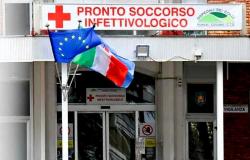On Monday 29 April at 6 pm the new essay by Antonio Mazzeo, “School goes to war, will be presented at the Feltrinelli bookshop in Messina (via Ghibellina 32). Investigation into the militarization of education in Italy”, published by Manifestolibri (Rome). The Jesuit theologian Father Felice Scalia and the sociologist Tania Poguisch will dialogue with the author.
In the volume, Antonio Mazzeo describes the ways in which the Italian school is abdicating its educational and training functions of the new generations, allowing the Armed Forces and weapons manufacturing companies to occupy every sphere of teaching for ideological purposes absolutely in contrast with the values constitutional principles of the defense of freedoms, democracy, social justice and peace on which public education should be based.
The author begins his reflection by describing some of the most dramatic processes that are affecting Italian schools. “At the same time as the privatization and precarization of the education system, we are witnessing a suffocating process of militarization of educational institutions and of the cultural and educational contents themselves”, says the author. “As happened in the times of fascism, schools return to being barracks while the barracks are converted into classrooms and gyms to train the student-soldier devoted to perpetual obedience. In schools of all levels, behaviors, paths and curricula are experimented with that are completely subordinate to the logic of war and political-military interests, thanks above all to the governments that alternate at the helm of the country, the immovable bureaucrats of the Ministry of Education (and , today, of Merit) and the managers now recruited only if rigid observants of the prevailing neoliberal and militarist thought”.
The examples described are numerous although little known to public opinion and to educators and teachers themselves, mostly inattentive or perhaps even normalized by the disvalues imposed on Italian society by the senseless logic of the market. “It so happens that over cities of art, museums and archaeological sites, principals and teachers increasingly prefer visits to US and NATO bases “hosted” in Italy in defiance of the Constitution; or those at barracks, airports, military ports, radar installations and war industries”, says Mazzeo. “There isn’t a day that students aren’t called to attend military ceremonies and parades, arm presentations and flag raising, awards of honors, exhibitions of ancient relics or more modern destruction technologies. Then there are the educational-cultural activities entrusted to generals and admirals teachers (from the reading and interpretation of the Constitution and History to environmental education, health, the fight to drugs and the prevention of behaviors classified as “deviant”, bullying, cyberbullying, etc.); the choirs and bands of students and soldiers; training courses on fighter-bombers, tanks, submarines and war frigates; school-work alternation alongside the elite departments of the Armed Forces or in weapons manufacturing companies. The frenetic activism of the military in the school sector is also manifested in the collection and donation of books and teaching aids to disadvantaged students and institutions; the establishment of scholarships or prizes named after war “heroes” or those who died during international missions; lobbying local authorities to name new school buildings after those missing in combat or those decorated with gold medals for military valor”.
Antonio Mazzeo also expresses deep concern for the “progressive transformation of school structures for security purposes” with the installation of video cameras at entrances and corridors and the proliferation of electronic identification and social control devices (turnstiles at doors, the obligation for students and teachers to wear badges, the illegitimate imposition on the use of the electronic attendance recorder of educational staff, etc.). In a real climate of witch hunts and general criminalisation, police commissioners and prefects order incursions by the police forces into the classrooms with extensive searches and drug-detection dogs unleashed to sniff backpacks, jackets and coats”, explains the author.
“Bans on meetings and self-managed student activities also proliferate and school premises are declared off-limits in the afternoon, while criminal and civil action against any form of occupation is threatened”. The approval of laws which have given principals unlimited powers and institutionalized hierarchies and discrimination among teachers also contribute to the strengthening of the process of militarization of the school system; the de jure and de facto precariousness of the figure and functions of the teacher; the widespread disempowerment of collegiate bodies; the indiscriminate use of administrative proceedings against disobedient school staff.
In the final chapter of the volume, however, the author tries to suggest possible alternative educational paths to “demilitarize” education in support of peace and disarmament, freedom of expression and teaching, public school and the fundamental values of formal and substantial equality and social justice.
The author: Antonio Mazzeo
Antonio Mazzeo is a teacher, peace-researcher and essayist involved in the issues of peace, disarmament, the environment, human rights and the fight against mafia crime. He collaborates with Il Manifesto and other national newspapers and in 2020 he was awarded by the Disarmo Archive with the “Golden Dove for Peace” in recognition “for having interpreted journalism and writing for years as a mission to defend rights human and to denounce injustices”. He is among the promoters of the Observatory against the militarization of schools and universities.
Continue reading on StrettoWeb





